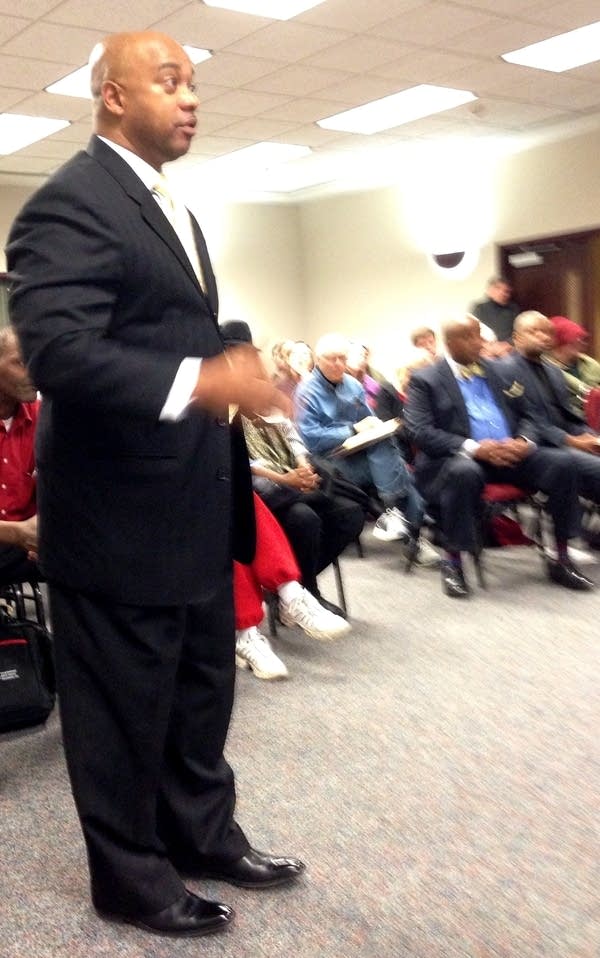Vikings stadium builders promise they won’t upturn neighborhood

Clad in a Green Bay Packers’ jersey, Velocity Telephone network engineer Todd Miller had two reasons for attending a Thursday meeting on the construction status of the Vikings stadium.
“We’ve got communications infrastructure downtown,” Miller said. “I’m here for the business to make sure there’s no disruptions, and I’m here as a fan to make sure there’s no unfair advantages given to the Vikings in upcoming days.”
About 60 people gathered in a basement room across from the Metrodome with officials from the Minnesota Sports Facilities Authority, the Minnesota Vikings and Mortenson Construction, the firm chosen to build the stadium.
There was none of the contention of earlier community meetings about the stadium. Most people were there to hear how the project, which will be built over the next three years, will affect their businesses or the economic fortunes of their communities.
Create a More Connected Minnesota
MPR News is your trusted resource for the news you need. With your support, MPR News brings accessible, courageous journalism and authentic conversation to everyone - free of paywalls and barriers. Your gift makes a difference.
Cody Walker, manager of Hubert’s Bar and Grill near the Metrodome, said he came to the meeting to learn how the bar would be affected by road closures and the presence of hundreds of construction workers, which perhaps could lead to more business.
“We’ll be losing out obviously on revenue from what had been going on in the stadium before, we’ll hopefully be able to recoup some of that through additional stuff that’s going to be replacing stadium events through the next few years,” Walker said.
Mortenson Construction Senior Vice President John Wood said the company will be monitoring vibrations caused by the construction, and that they’ve taken steps to mitigate dust and noise. Road closures will be limited to when it's absolutely necessary. Between now and March, residents will see three cranes rise on the construction site.
“This is a big, complicated construction project,” Wood told the crowd. “We promise you that we will do everything possible to mitigate and minimize any disruption that is caused by this project.”
Samuel Dougherty lives on the other side of downtown and has followed developments on the project closely because he’s hoping to work on the stadium.
“I’m in the drywall business,” Dougherty said. “I’m working as a minority contractor, so I’m involved with three different companies as a disadvantaged contractor.”
The project has set the goal of employing 32 percent minority workers and 6 percent women. Lynn Littlejohn of Mortenson Construction said there are currently 75 workers on site, with plans for more than 300 by spring. She said the workforce currently consists of about 34 percent minority workers and 12 percent women.
Jerry McAfee, president of the Minneapolis chapter of the NAACP, asked the company representatives for an ethnic breakdown of those numbers.
“You can have a goal of 32 percent workforce and 5 percent of those may not be African-Americans working,” McAfee said. “A lot of times, people get other ethnic groups, but they leave our ethnic group out, that’s why I wanted breakdowns by ethnicity.”
McAfee said he’s so far been pleased with the company's openness about the hiring processes for the stadium construction.
Cyndy Harrison, an owner of nearby Sawatdee, said the construction could be positive or negative for her business, but that she was impressed with the stadium officials willingness to make themselves available for people in the community who have problems related to the stadium construction.
“I’m more informed,” she said. “I really didn’t know what they were planning at all, and I didn’t know about their plans of closing streets and closing lanes or anything like that.”
Minnesota Sports Facilities Authority chair Michele Kelm-Helgen said this was only the first of many meetings that officials have planned to update nearby residents and businesses on the construction progress. At the end of the meeting, Kelm-Helgen and other officials gave out their contact information.
“This is hard work,” Kelm-Helgen said. “We just want to keep working together to identify problems before they get out of control, and fix them, and then be able to report back transparently about where we’re at.”
The $1 billion stadium itself is only a portion of the construction nearby residents and businesses will have to cope with. Plans for the $400 million project include two connected towers, an urban park and parking ramp. The city of Minneapolis released a request for proposal this week for a liner parcel the air rights plane for “block 1” at 728 South 4th Street. The block is currently owned by the Star Tribune, but Ryan Companies has an agreement to acquire the block and build a parking ramp.